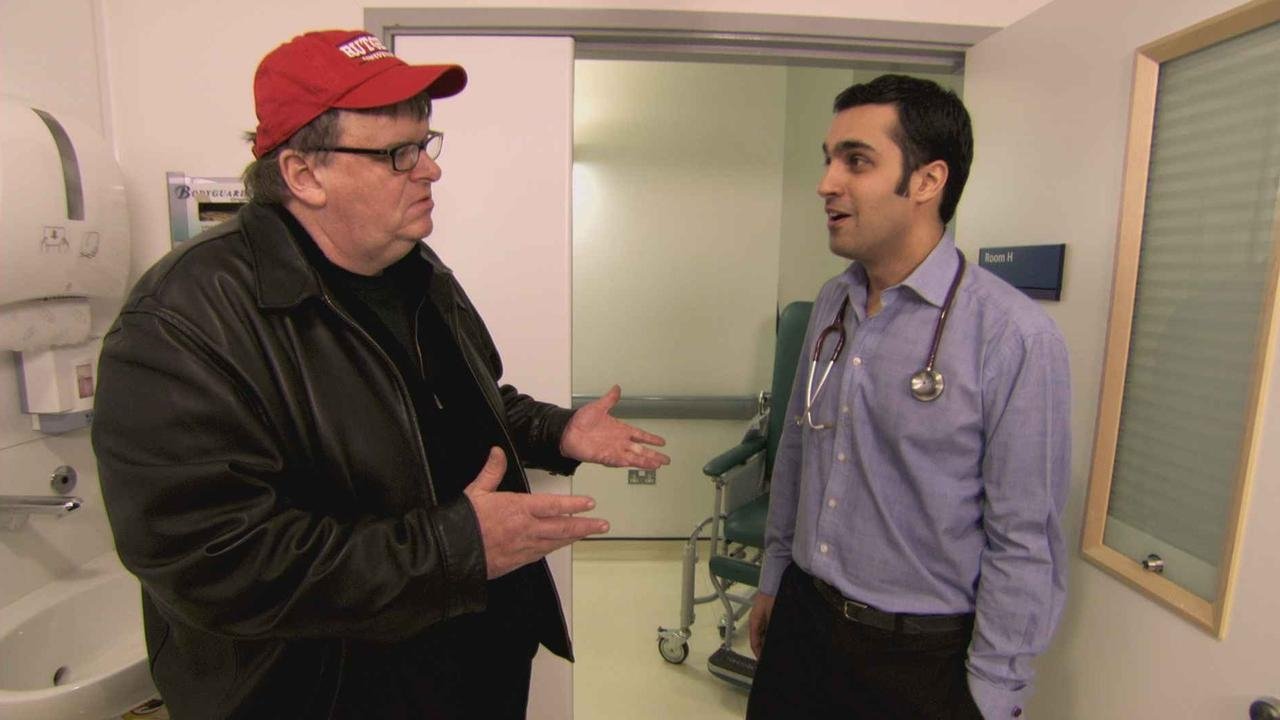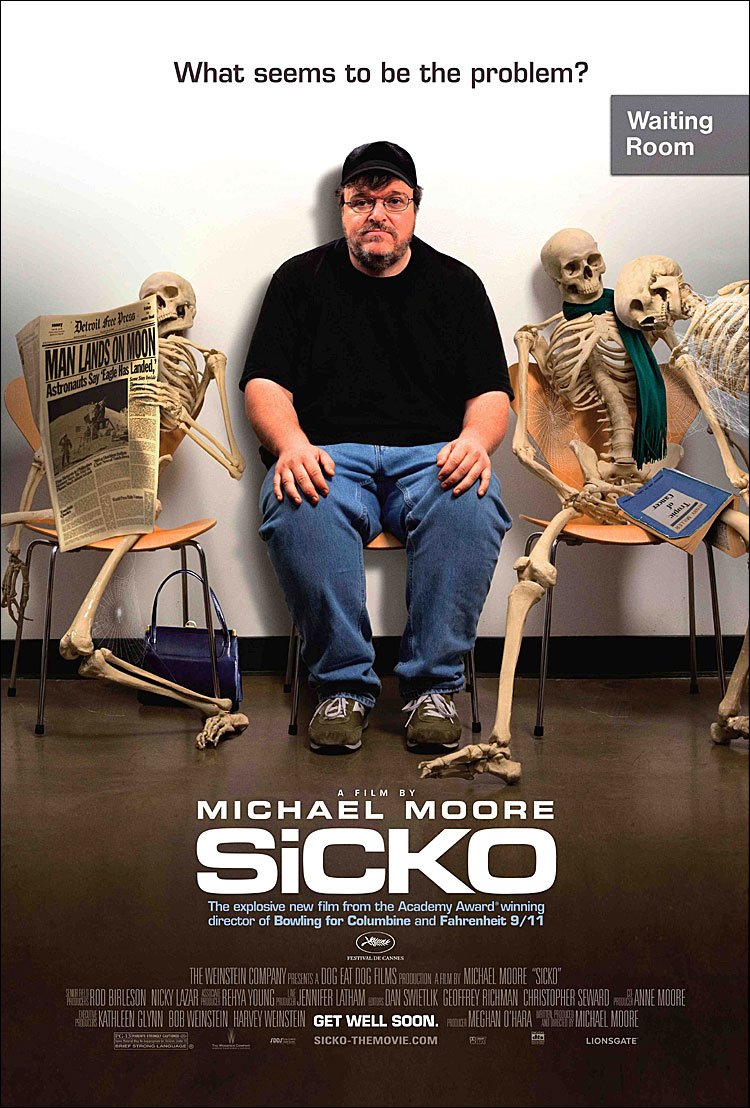For his follow-up to the polemic Fahrenheit 9/11, Michael Moore has chosen a less divisive, yet no less controversial topic: the American healthcare system. As Moore’s recent verbal death match on CNN with medical doctor and correspondent Sanjay Gupta proves, there’s still a wide degree of separation of agreement on the severity of the problem and a lot of misinformation about socialized medicine in countries like Canada. Sicko has its problems, but I think it’s Moore’s best movie since Roger & Me; a profoundly upsetting film and a rallying cry to fix a terribly destructive system that’s supposed to care for people.
The film opens with testimonials from average Joes that make up the roughly 47 million Americans that have no health insurance coverage; a man that had to suture his own knee wound, a man that had to choose between the cheaper of two finger tips to have reattached, and so on. But Moore’s voiceover lets us know that this movie is not about the uninsured, but rather it’s about other Americans that have coverage, only to face complications, rejections and refusals as the insurance companies put profit before medicine.
Moore hits fast and hits often with an impossibly sad series of stories involving the insurance industry for much of the first hour. There’s the case of a retired couple that are forced to move cross-country to live with one of their children because their insurance company has cut them off. A 70-something year old senior works stock at a local store so that he can afford all the meds that he and his wife need. A young woman in her twenties faces a slow death from cancer after her insurance company refuses a treatment that would have stopped the cancer before it spread throughout her body.

The filmmaker keeps hitting you with these unbelievable stories that make you question the very nature of so-called American compassion. Certainly, these are the worst case scenarios, but then we see things from the insurance company side. Of course, no one “official” from the insurance companies appears on camera (they had sent out memoranda warning execs to steer clear of Moore after all), but Moore gets some surprising insights from insurance company underlings.
He talks to an operator who breaks down into tears while talking about how she knows when the people that call in looking for insurance aren’t going to get and how the false hope that engenders in insurance seekers sickens her. There’s also a conversation with an insurance company investigator, whose job it was to dig into a patients past in order to find a reason that the insurance company might deny the claim. Moore talks to one woman who had a payout for a serious operation denied by her insurance carrier because at the time she applied, she had failed to disclose that she’d once had a yeast infection.
For much of the second hour, Moore looks into systems of socialized medicine in Canada, Britain and France; this is also the portion where the director’s humour and sense of fun is allowed to play again. He visits relatives in Windsor and goes with them to the local Sears where they get travellers’ insurance because they refuse to cross the Ambassador bridge, even for a couple of hours, without it. Moore also visits American ex-pats living in France and discusses the tremendous government-offered luxuries in that country, including shorted work weeks, extended vacations and state-sponsored childcare. Moore and his camera also ride along with a doctor that does nothing but make house calls, like a pizza delivery driver of medical care.
Of course, any reasonable person will realize that Moore is overly fawning of these systems and never breaches the facts of wait times in Canada or federal deficits in France. But in watching the mainstream, American network coverage of Sicko, why would Moore have to? While not stating it as such, to hear people like Gupta talk, it’s as if you walk into an emergency room in London ON with a knife in your back and the attending nurse tells you to come back in two weeks to have it pulled out, which we know is no where near true.
The message of the film seems to be, why can’t we? As in why can’t a country as rich and prosperous as the US find a way to ensure all of its people remain happy and healthy and can live that way without ending bankrupt, the number one cause of which in the US is medical bills. To my mind, Moore makes a convincing case, (mostly) without his usual high jinks. He points out that America already has socialized programs, education for example, so why should they fear socialized medicine? Moore makes his thesis that money is the reason why, too much money to be made and too many politicians being paid off with that money for them to raise a hand against it. No one, Republican or Democrat, is spared. Even Hilary Clinton, once the loudest cheerleader for Medicare reform, now takes a huge chunk of change from the insurance industry for her senatorial and presidential campaigns.
The stunt that made Sicko the target of a US Treasury Department investigation, a Moore sponsored trip to Cuba, is saved for the end. Sure, taking 9/11 rescue workers by boat to the entry to US naval base in Guantanamo Bay to get the same standard of care that enemy combatants interned there are getting, is pure Moore. But in Sicko, he builds up to his centrepiece of subversive journalism, it feels like the eventual arrival point of the story Moore was trying to tell. As much as I liked Bowling for Columbine, it was all over the place; an interview here, a cool sequence there, some animation, a publicity stunt or two and that’s it. By contrast, Sicko is focused like a laser lens.
With Sicko, Moore makes his game much more tight, he shows growth as a storyteller and a new kind of focus as an lobbyist. Roger & Me is good for its raw, everyman quality, while Sicko demonstrates an experienced hand that’s reined in to make a point rather than making it loud for the sake of volume. In America, this movie should be a rallying cry for change, here in Canada it should make one appreciative. Our system may not be perfect, but the numbers game Moore portrays as medical insurance in Sicko is hardly a better alternative.






